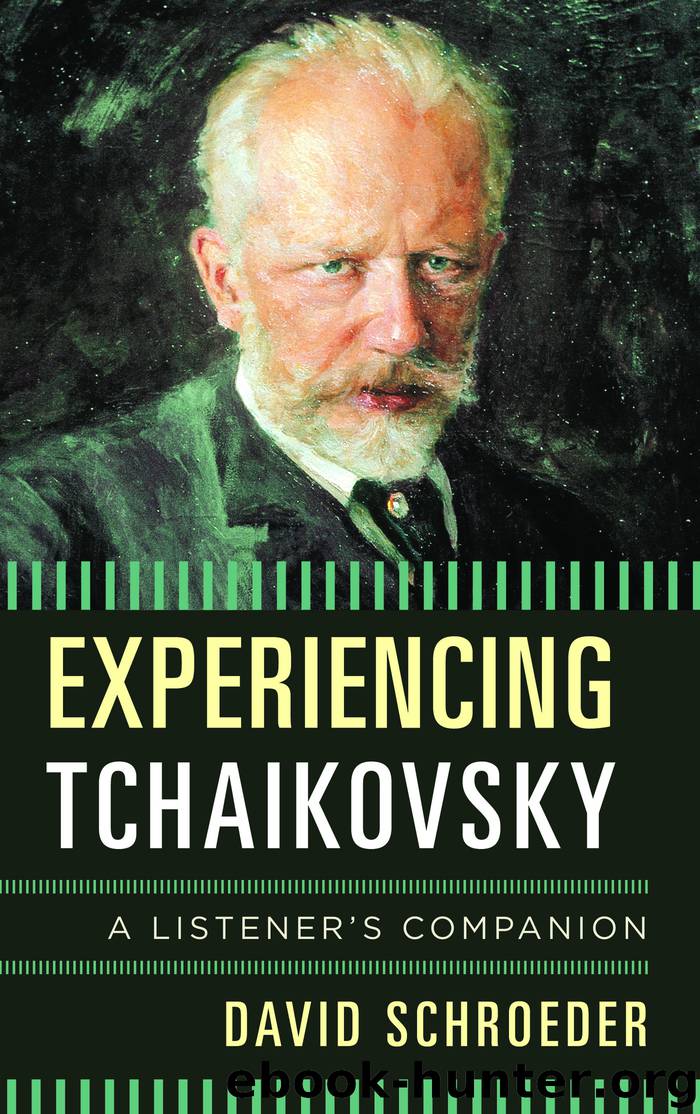Experiencing Tchaikovsky by David Schroeder

Author:David Schroeder
Language: eng
Format: epub
Tags: undefined
Publisher: Rowman & Littlefield Publishers
Published: 2012-03-15T00:00:00+00:00
Chapter 6
Symphony as Opera
During the two years following his Third Symphony Tchaikovsky underwent some life-changing experiences, and his music reflected these changes in the strongest possible ways. A large part of the difference between the Fourth Symphony and the previous one has to do with the dramatic effect a symphony should have on an audience in touching the human spirit at the deepest possible level, and he gave much thought to this when he started the Fourth near the beginning of 1877. The drama clearly should arise from within himself, and the more he endowed the works with this, the more an audience could respond. Aside from three earlier symphonies, he had by now thoroughly established himself as a composer of symphonic poems, with notable successes including the Shakespeare-inspired Romeo and Juliet (1869) and The Tempest (1873); most recently he had written Francesca da Rimini (1876), a fantasia based on Dante’s Inferno. Especially after Francesca he may have seen the symphony moving more in the direction of symphonic poems, and by now a long tradition existed of treating symphonies that way, starting with Beethoven’s Sixth, and progressing through Berlioz and Liszt. His greatest German contemporary as a symphonist, Johannes Brahms, proceeded along the lines of the German classical tradition, and he not only held no fascination for Tchaikovsky, but even evoked contempt, with what Tchaikovsky considered “pretentions to profundity.” That did not stop him from enjoying Brahms’s company when the two of them met in Hamburg, even getting drunk with him (he called him “a potbellied boozer”). Tchaikovsky sometimes regretted not being able to fashion his symphonies more on the classical mold, but when it came right down to it, that type of formal rigor did not suit his expressive purposes, since something very different prompted his symphonic language.
Download
This site does not store any files on its server. We only index and link to content provided by other sites. Please contact the content providers to delete copyright contents if any and email us, we'll remove relevant links or contents immediately.
| Books & Reading | Comparative Literature |
| Criticism & Theory | Genres & Styles |
| Movements & Periods | Reference |
| Regional & Cultural | Women Authors |
4 3 2 1: A Novel by Paul Auster(12358)
The handmaid's tale by Margaret Atwood(7735)
Giovanni's Room by James Baldwin(7307)
Asking the Right Questions: A Guide to Critical Thinking by M. Neil Browne & Stuart M. Keeley(5745)
Big Magic: Creative Living Beyond Fear by Elizabeth Gilbert(5731)
Ego Is the Enemy by Ryan Holiday(5398)
The Body: A Guide for Occupants by Bill Bryson(5067)
On Writing A Memoir of the Craft by Stephen King(4923)
Ken Follett - World without end by Ken Follett(4711)
Adulting by Kelly Williams Brown(4556)
Bluets by Maggie Nelson(4539)
Eat That Frog! by Brian Tracy(4505)
Guilty Pleasures by Laurell K Hamilton(4430)
The Poetry of Pablo Neruda by Pablo Neruda(4083)
Alive: The Story of the Andes Survivors by Piers Paul Read(4013)
White Noise - A Novel by Don DeLillo(3995)
Fingerprints of the Gods by Graham Hancock(3980)
The Book of Joy by Dalai Lama(3963)
The Bookshop by Penelope Fitzgerald(3829)
